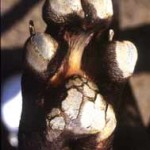Distemper. Most people have heard about it but few have seen it thanks to vaccinations. Unfortunately, every so many years, it will come back to rear it’s ugly head. It would seem that this summer is one of those unfortunate years as we have already seen quite a few cases that we believe to be distemper.
So, what is distemper? Almost everyone has heard of distemper, but most don’t know what it is or what it does. Well, distemper is a nasty virus that will attack the respiratory system, the intestinal system, and sometimes the nervous system of puppies and dogs. It most commonly affects puppies under 16 weeks of age that have not been fully vaccinated but it can also affect unvaccinated or improperly vaccinated adult dogs. It can also infect foxes, wolves, coyotes, raccoons, skunks, and ferrets and often this is how it gets back into the pet population. It is most commonly spread through respiratory secretions of infected dogs but can also be spread through other secretions. Unfortunately, anything or anyone that comes in contact with these secretions can potentially spread the virus to other dogs. The one good thing is that the virus doesn’t survive for much longer than a few hours at room temperature and is pretty easily killed in the environment by bleach or quaternary ammonium disinfectants.
What are the symptoms of canine distemper? The first symptoms that we may see are a greenish or yellowish eye and nose discharge. It can be watery to very thick and mucusy. This can progress to a cough and in some cases into pneumonia. These dogs can be lethargic, may have a fever, and may lose their appetite. Vomiting and diarrhea may also develop. You may also see thickening of the nose and foot pads. The first signs of distemper can develop about 1-2 weeks after exposure to the virus but in some cases can take as long as 4-5 weeks. Often dogs with distemper may appear to recover from all of these symptoms, only to have the virus spread to their nervous system. About 1-3 weeks later they may develop neurological symptoms such as seizures, tremors or twitching, imbalance, or muscle weakness. These symptoms may progress to death, or can cause permanent damage to the pet. Some can recover from this is their immune system is strong enough.
Diagnosis and treatment of distemper are challenging. There are several ways to test for distemper. The problem is that recent vaccination may interfere with some tests giving a “false positive” result. “False negative” results are also possible with testing as the virus can be hard to find in some pets. For this reason, clinical symptoms combined with testing are used to try and diagnose distemper. The other challenge with diagnosis is that distemper can look like other diseases such as Kennel Cough or other respiratory infections, Parvo, or Epilepsy. As for treatment, we don’t have anything that will cure distemper. Treatment is aimed at helping the dog with the symptoms they have. Preventing secondary infections with antibiotics, helping with dehydration from vomiting or diarrhea with IV fluids, and treatment for seizures are some examples of helping dogs with the symptoms of distemper.
The good news in all of this is that distemper is a preventable disease. The vaccine for distemper is highly effective in preventing the disease. Puppies begin the vaccine at their veterinarian at 6 weeks of age and then receive boosters every 3-4 weeks until 16 weeks of age, then they receive annual vaccination. We strongly discourage owners from doing their own vaccinations as we often see these vaccinations fail due to improper storage, improper handling, given in an improper series, or are just poor quality vaccination. In addition, when your dog completes it’s distemper vaccinations at our hospital, that distemper vaccine is guaranteed by the manufacturer. Don’t let your dog become a victim to distemper this summer. Call to get your dog vaccinated today!


